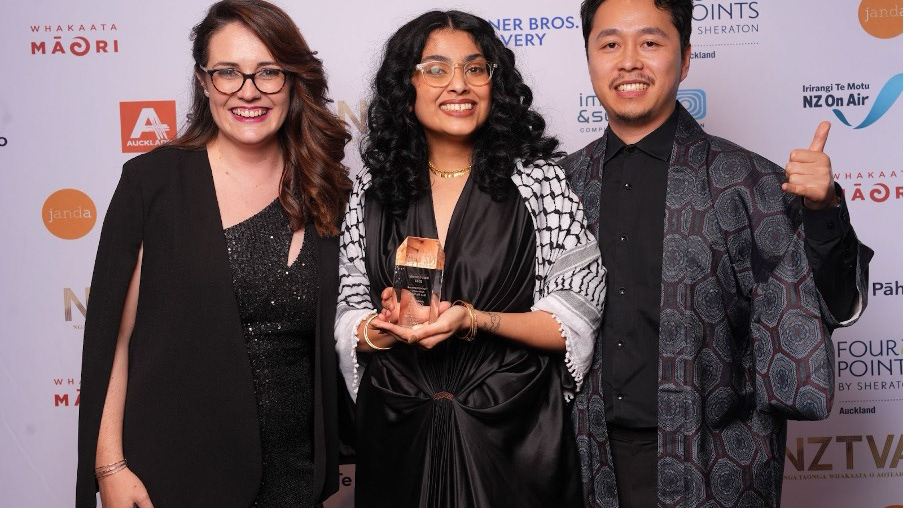
Ankita Singh posing in her mother's sari,. photo by Jenny Gao 2022
Ankita Singh was unaware that she would make history when she received a national commission from the Auckland Theatre Company to write a play.
"I didn't know I was the first South Asian female to be commissioned by Auckland Theatre Company," she said.
"If I had known, I might have written a more serious play."
Her play, Basmati Bitch, described as a "neo-noir action-crime comedy", will premiere at Auckland's Q Theatre on 11 July.
Set in a dystopian future where climate change has destroyed crops and led to the banning of ethnic dietary staples such as rice, Basmati Bitch takes viewers into a heightened reality of contested borders, exploited migrant workers and a crumbling empire.
"I feel very humbled standing on the shoulders of giants like Jacob Rajan, who paved the way for people like me," Singh said.
"Ten years ago, I wouldn't even dream of something like this."
Singh, who grew up in Kirikiriroa (Hamilton), was an avid reader as a child.
"I read a lot of fantasy and made up a lot of stories in my head. Looking back, that's probably where my love for storytelling came from."
She found solace in stories as they provided an escape from reality, which was particularly challenging for her as a young immigrant from India.
"I was overweight, very nerdy and an introverted young woman.
"I didn't even speak English properly and couldn't read and write Hindi. I was still learning when we moved. It was tough."
But stories kept her going.
"Stories provided an escape in a place where you could feel powerful and kind of free."
Singh's journey into the theatre world began with a master's course in creative writing and an internship at the Indian Ink Theatre Company.
"As soon as I started studying writing, it felt like the universe started making things happen."
She went on to win the 2021 Piki Pitch and receive funding to write an episode for a TVNZ anthology production.
And then Basmati happened.

Ahi Karunaharan at a Basmati Bitch rehearsal session. Photo: Andi Crown
"Ankita is a fresh voice for New Zealand, and she is an exciting voice," said director of the play Ahi Karunaharan.
"She is a voice of this generation because when I was writing or making theatre 20 years ago, there was nobody else except Jacob Rajan and Indian Ink. And all our stories were about leaving our home countries, the diasporic narrative.
"What I love about her is that she has grown up in a diet of anime action cartoons and she has a very global perspective. It's very nuanced, layered and funny."
Karunaharan met Singh when she was working for Indian Ink as an intern.
"I was working at another a theatre company called Basement and we both connected because the theatre space in New Zealand is predominantly white, so it was nice to see another South Asian working across the corridor."
For Singh, representation is crucial.
"Basmati is part of a new wave of South Asians. We're evolving from rehashing the immigrant struggle narrative to more future-oriented and unapologetic diasporic content.
"We're sort of evolving from like just rehashing the kind of immigrant struggle narrative that's been told many, many times, and it was important because it was a real experience.
"We're now looking to the future more and I'm seeing a lot more diasporic content that's a lot more future facing (and) not as apologetic about us existing here."
...



